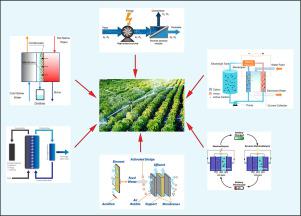当前位置:
X-MOL 学术
›
Desalination
›
论文详情
Our official English website, www.x-mol.net, welcomes your feedback! (Note: you will need to create a separate account there.)
Membrane desalination and water re-use for agriculture: State of the art and future outlook
Desalination ( IF 9.9 ) Pub Date : 2020-10-01 , DOI: 10.1016/j.desal.2020.114559 Wafa Suwaileh , Daniel Johnson , Nidal Hilal
Desalination ( IF 9.9 ) Pub Date : 2020-10-01 , DOI: 10.1016/j.desal.2020.114559 Wafa Suwaileh , Daniel Johnson , Nidal Hilal

|
Abstract Membrane-based desalination technologies for agricultural applications are widely applied in many countries around the world. Sustainable and cost-effective desalination technologies, such as reverse osmosis (RO), membrane distillation, forward osmosis, membrane bioreactor, and electrodialysis, are available to provide treated water, but the pure water product does not contain the required level of nutrients to supply agricultural fields. This can be overcome by the use of blended water to meet the required quality of irrigation water for crop production, which is expensive in areas lacking in freshwater resources. The adoption of a hybrid system offers many advantages, such as generating drinking water and water enriched with nutrient at low cost and energy consumption if natural power is used. This review focusses on summarizing the current and recent trends in membrane desalination processes used for agricultural purposes. The challenges being faced with desalinating seawater/brackish water and wastewater are discussed. A specific focus was placed on the viability of hybrid desalination processes and other advanced recovery systems to obtain valuable irrigation water. A comparison between various membrane desalination technologies in terms of treatment efficiency and resource recovery potential is discussed. Lastly, concluding remarks and research opportunities of membrane technologies are analyzed. We concluded that the ED process can be utilized to minimize the energy requirements of other membrane technologies. The MD coupled with ED system can also be utilized to generate high quality irrigation water at low energy requirement. The FO-ED hybrid system exhibited excellent performance and very low energy consumption as compared to other hybrid systems.
中文翻译:

膜法海水淡化和农业水再利用:最新技术和未来展望
摘要 农业用膜法海水淡化技术在世界许多国家得到广泛应用。可持续且具有成本效益的海水淡化技术,如反渗透 (RO)、膜蒸馏、正渗透、膜生物反应器和电渗析,可用于提供处理水,但纯水产品不包含供应所需的营养水平农业领域。这可以通过使用混合水来满足作物生产所需的灌溉水质量来克服,这在缺乏淡水资源的地区是昂贵的。采用混合系统提供了许多优势,例如,如果使用自然能源,以低成本和能源消耗生产饮用水和富含营养的水。本综述重点总结了用于农业目的的膜脱盐工艺的当前和近期趋势。讨论了淡化海水/微咸水和废水所面临的挑战。特别关注混合海水淡化工艺和其他先进回收系统的可行性,以获得有价值的灌溉水。讨论了各种膜脱盐技术在处理效率和资源回收潜力方面的比较。最后,分析了膜技术的结束语和研究机会。我们得出结论,ED 工艺可用于最大限度地减少其他膜技术的能源需求。MD 与 ED 系统结合也可用于以低能量需求产生高质量的灌溉水。
更新日期:2020-10-01
中文翻译:

膜法海水淡化和农业水再利用:最新技术和未来展望
摘要 农业用膜法海水淡化技术在世界许多国家得到广泛应用。可持续且具有成本效益的海水淡化技术,如反渗透 (RO)、膜蒸馏、正渗透、膜生物反应器和电渗析,可用于提供处理水,但纯水产品不包含供应所需的营养水平农业领域。这可以通过使用混合水来满足作物生产所需的灌溉水质量来克服,这在缺乏淡水资源的地区是昂贵的。采用混合系统提供了许多优势,例如,如果使用自然能源,以低成本和能源消耗生产饮用水和富含营养的水。本综述重点总结了用于农业目的的膜脱盐工艺的当前和近期趋势。讨论了淡化海水/微咸水和废水所面临的挑战。特别关注混合海水淡化工艺和其他先进回收系统的可行性,以获得有价值的灌溉水。讨论了各种膜脱盐技术在处理效率和资源回收潜力方面的比较。最后,分析了膜技术的结束语和研究机会。我们得出结论,ED 工艺可用于最大限度地减少其他膜技术的能源需求。MD 与 ED 系统结合也可用于以低能量需求产生高质量的灌溉水。


























 京公网安备 11010802027423号
京公网安备 11010802027423号